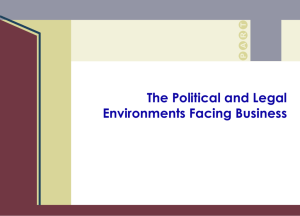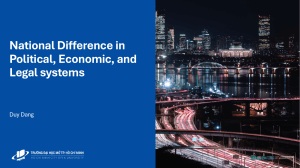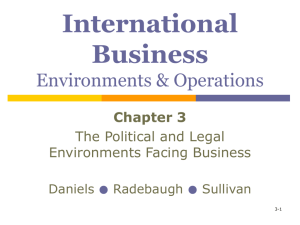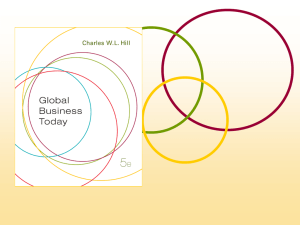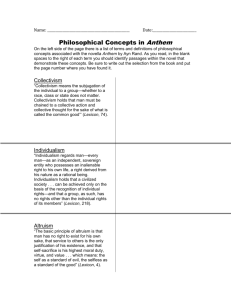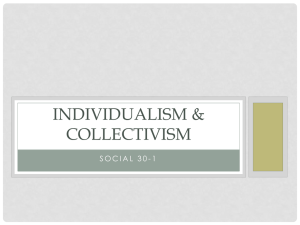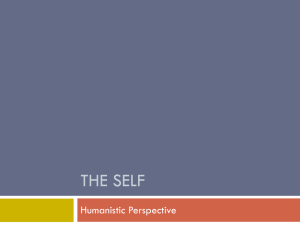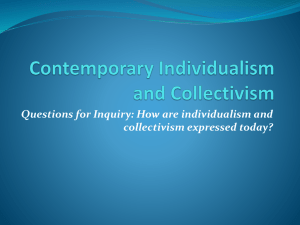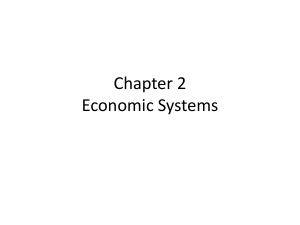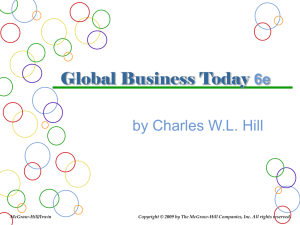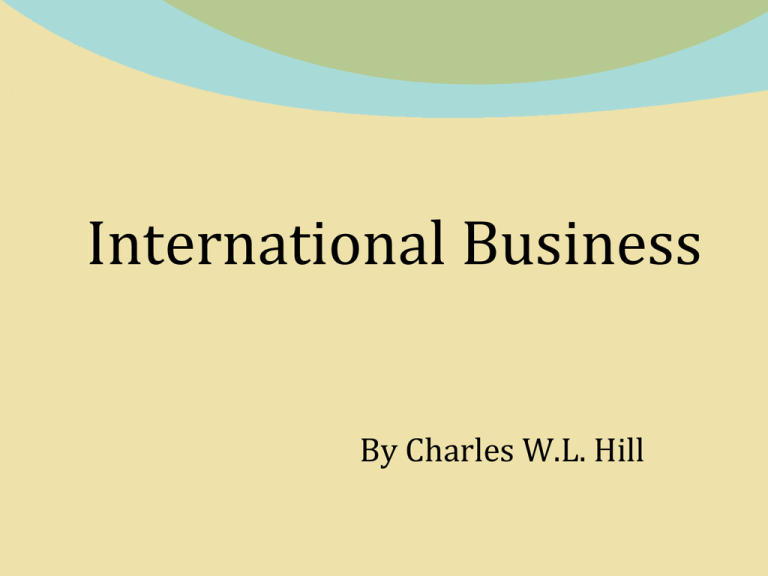
International Business
By Charles W.L. Hill
Chapter 2
National Differences
in Political Economy
McGraw-Hill/Irwin
Copyright © 2011 by the McGraw-Hill Companies, Inc. All rights reserved.
What Is A Political Economy?
The political economy of a nation refers to
how the political, economic, and legal
systems of a country are interdependent
they interact and influence each other
they affect the level of economic well-being in
the nation
2-3
What Is A Political System?
Political system refers to the system of
government in a nation
Assessed according to
the degree to which the country emphasizes
collectivism as opposed to individualism
the degree to which the country is democratic
or totalitarian
2-4
What Is Collectivism?
Collectivism stresses the primacy of
collective goals over individual goals
Today, collectivism is equated with
socialists (Karl Marx 1818-1883)
advocate state ownership of the basic means of
production, distribution, and exchange
manage to benefit society as a whole, rather
than individual capitalists
2-5
How Does Modern-Day
Socialism Look?
In the early 20th century, socialism split into
1. Communism – socialism can only be achieved
through violent revolution and totalitarian
dictatorship
in retreat worldwide by mid-1990s
2. Social democrats – socialism is achieved
through democratic means
retreating as many countries move toward free
market economies
state-owned enterprises have been privatized
2-6
What Is Individualism?
Individualism refers to philosophy that an
individual should have freedom in his own
economic and political pursuits
individual economic and political freedoms are the
ground rules on which a society should be based
implies democratic political systems and free market
economies
2-7
What Is Democracy?
Democracy refers to a political system in which
government is by the people, exercised either
directly or through elected representatives
usually associated with individualism
pure democracy is based on the belief that citizens
should be directly involved in decision making
most modern democratic states practice
representative democracy where citizens periodically
elect individuals to represent them
2-8
What Is An Economic System?
1.
There are three types of economic systems
Market economies - all productive activities are privately
owned and production is determined by the interaction of
supply and demand
2.
Command economies - government plans the goods and
services that a country produces, the quantity that is
produced, and the prices as which they are sold
3.
Mixed economies - certain sectors of the economy are left to
private ownership and free market mechanisms while other
sectors have significant state ownership and government
planning
2-9
What Is A Legal System?
The legal system of a country refers to the rules
that regulate behavior along with the processes
by which the laws are enforced and through
which redress for grievances is obtained
There are three types of legal systems
1. Common law - based on tradition, precedent,
and custom
2. Civic law - based on detailed set of laws
organized into codes
3. Theocratic law - law is based on religious
teachings
2-10
Which Countries Are
Most Corrupt?
Rankings of Corruption by Country 2008
2-11
How Can Intellectual
Property Be Protected?
Intellectual property - property that is the product of
intellectual activity
Can be protected using
1. Patents – exclusive rights for a defined period to the
manufacture, use, or sale of that invention
2. Copyrights – the exclusive legal rights of authors,
composers, playwrights, artists, and publishers to publish
and disperse their work as they see fit
3. Trademarks – design and names by which merchants or
manufacturers designate and differentiate their products
2-12
How Can Intellectual
Property Be Protected?
Protection of intellectual property rights differs
from country to country
World Intellectual Property Organization
Paris Convention for the Protection of Industrial
Property
To avoid piracy, firms can
stay away from countries where intellectual property
laws are lax
file lawsuits
lobby governments for international property rights
agreements and enforcement
2-13
What Determines A Country’s Level
Of Economic Development?
Two ways to measure levels of economic
development are
1. Gross national income (GNI) per person
2. Purchasing power parity (PPP) involves
adjusting GNI by purchasing power
2-14
What Determines A Country’s Level
Of Economic Development?
The United Nations used Sen’s ideas to
develop the Human Development Index
(HDI) which is based on
life expectancy at birth
educational attainment
whether average incomes are sufficient to
meet the basic needs of life in a country
2-15
How Does Political Economy
Influence Economic Progress?
Innovation and entrepreneurship are the engines
of long-run economic growth
Innovation and entrepreneurship require a
market economy and strong property rights
Democratic regimes are probably more conducive
to long-term economic growth than dictatorships,
even the benevolent kind
Subsequent economic growth leads to the
establishment of democratic regimes
2-16
How Do Geography And Education
Influence Economic Development?
Countries with favorable geography are
more likely to engage in trade, and so, be
more open to market-based economic
systems, and the economic growth they
promote
Countries that invest in education have
higher growth rates because the workforce
is more productive
2-17
How Free Are
Countries Politically?
Political Freedom in 2008
2-18
How Free Are
Countries Economically?
Distribution of Economic Freedom in 2008
2-19
What Is The Nature Of
Economic Transformation?
The shift toward a market-based system
involves
deregulation – removing legal restrictions to
the free play of markets, the establishment of
private enterprises, and the manner in which
private enterprises operate
privatization - transfers the ownership of state
property into the hands of private investors
the creation of a legal system to safeguard
property rights
2-20
What Does The Changing
Economy Mean For Managers?
Managers must consider
1. Political risk - the likelihood that political forces will
cause drastic changes in a country's business
environment that adversely affects the profit and other
goals of a business enterprise
2. Economic risk - the likelihood that economic
mismanagement will cause drastic changes in a country's
business environment that adversely affects the profit and
other goals of a business enterprise
3. Legal risk - the likelihood that a trading partner will
opportunistically break a contract or expropriate
property rights
2-21
Review Question
A political system that stresses the primacy of
collective goals over individual goals is called
a) individualism
b) collectivism
c) a democracy
d) a market economy
2-22
Review Question
_____ believe(s) that socialism can only be
achieved through violent revolution and
totalitarian dictatorship.
a) social democrats
b) communists
c) social republicans
d) Plato
2-23
Review Question
In which type of economic system are all
productive activities privately owned?
a) a mixed economy
b) a command economy
c) a representative economy
d) a market economy
2-24
Review Question
Which type of law is based on tradition,
precedent, and custom?
a) civil law
b) common law
c) theocratic law
d) contract law
2-25
Review Question
Which country is not among the most corrupt
countries in the world?
a) Haiti
b) Indonesia
c) Malaysia
d) Nigeria
2-26
Review Question
Design and names by which merchants or
manufacturers designate and differentiate
their products are called
a) trademarks
b) copyrights
c) patents
d) name brands
2-27
Review Question
Which is not a primary determinant of a
nation’s rate of economic development?
a) its political system
b) its economic system
c) its geography
d) its currency
2-28

